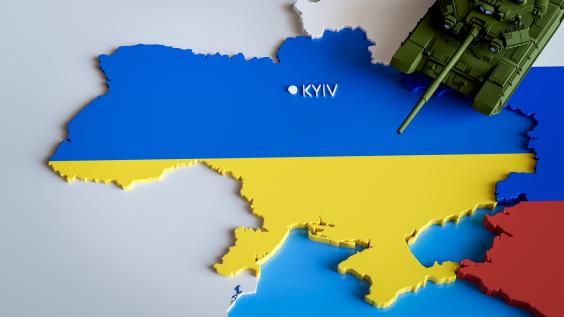Ukraine Maintains Initiative Despite Disappointing Counteroffensive

Table of Contents
Author(s)
Share this Publication
- Print This Publication
- Cite This Publication Copy Citation
Joe Barnes, "Ukraine Maintains Initiative Despite Disappointing Counteroffensive" (Houston: Rice University’s Baker Institute for Public Policy, September 15, 2023).
The much-awaited Ukrainian counteroffensive against Russia is now over three months old. It is proving a bloody slog for Ukrainian forces. Early — perhaps unfounded — hopes that a quick breakthrough would divide the Russian-occupied territory in two have faded, though the Ukrainian military maintains the initiative.
Off the battlefield, focus has turned to the flow of weapons and munitions to Kyiv from Ukraine’s supporters — including the United States. While U.S. Democrats continue to support President Joe Biden’s position on Ukraine, Republican opinion is fractured. Meanwhile, the weak G-20 statement on Russian aggression reveals — yet again — that the pro-Ukraine international coalition is largely limited to the United States’ traditional allies.
War is an unpredictable endeavor. It is far too early to dismiss the Ukrainian counteroffensive as a failure, but the going has been slow for Ukraine since the counteroffensive began in June. Early efforts to achieve a large-scale breakthrough against the Russian army faltered. The Ukrainians have shifted their tactics to more modest attacks against Russia’s multi-line defensive positions. Huge Russian minefields have proven to be a costly and time-consuming barrier to the Ukrainian advance. However slow and painful, progress has been made in places along the front, notably with Ukraine advancing in the Zaporizhzhia region.
The slow pace of the counteroffensive to date has led to some (largely anonymous) grumbling about Ukrainian performance among U.S. officials. Ukrainians, in turn, have complained about the slow pace of weapon and munitions delivery by the United States and other supporters. The United States, under the leadership of President Joe Biden, remains a staunch supporter of the Ukraine. There are no signs in the short term of abandonment of Ukraine by Washington or European capitals. But if the war lingers on, frustrations may build.
As the possibility of a lengthy war increases, talk of the flow of weapons and munitions to Ukraine has intensified. Artillery ammunition remains in short supply — this is a crippling shortfall in a battle of attrition. And Ukraine is keenly awaiting the F-16 fighter aircraft from European NATO countries. Additional armored vehicles and long-range missiles are also in the pipeline. Ukrainian officials see these new weapons as vital to achieve a decisive breakthrough, defeat the Russian military and drive the invader from its positions in southern Ukraine.
The possibility of peace talks appears as remote as ever. Ukraine still holds the military initiative and, by all appearances, the country’s morale remains high. The forthcoming flow of weaponry also offers the promise of victory. In other words, Ukraine is in no mood for compromise. For his part, Russian President Vladimir Putin’s personal investment in the Russia-Ukraine war is huge. Any settlement that smacks of a defeat for Russia will represent a powerful blow to the dictator’s prestige — and perhaps even his hold on power.
Oddly enough, the weak link in the pro-Ukraine coalition might be the United States: 2024 is an election year and there are differences on Ukraine policy among the candidates for the presidency.
While Biden remains a staunch supporter of Ukraine in its fight against Russia, this support has limits. The administration has drawn the line at direct U.S. military involvement in Ukraine or other steps — such as bringing Ukraine into NATO — that would likely prompt hostilities with Russia. Biden was initially hesitant to provide Ukraine with weapons that could be used to strike Russia. Since then, he has only provided Ukraine with material support, he has also led an international coalition to aid Kyiv and punish Moscow. Although Biden’s advanced age clouds his suitability for another presidential term, he remains the favorite for the Democratic nomination.
Republican candidates for their party’s presidential nomination are a mixed bag when it comes to Ukraine. This mirrors the split in congressional Republicans where a vocal minority is staking out a position critical of U.S. assistance to Ukraine. Republican front-runner former President Donald Trump has declared that he will end the war within 24 hours, but he has not provided any details as to how. Given Trump’s admiration of Putin, Ukraine has grounds to fear a Trump presidency. Billionaire Vivek Ramaswamy opposes Biden’s open-ended support for Ukraine. Florida Gov. Ron DeSantis, after first minimizing the war as a “territorial dispute,” has now assumed a pro-Ukrainian stance. Other Republican candidates by and large advocate strong support for Ukraine.
While the U.S.-led coalition supporting the Ukraine may be strong at present, it is important to note that this coalition is largely confined to U.S. allies. Rhetorical support for Ukraine may be common around the globe, but some of the world’s most powerful nations are either pro-Russia (China) or neutral (India and Brazil). This was clearly demonstrated at the recent G-20 Summit in New Delhi when the communiqué watered down last year’s language condemning Russia’s invasion of Ukraine.
This material may be quoted or reproduced without prior permission, provided appropriate credit is given to the author and Rice University’s Baker Institute for Public Policy. The views expressed herein are those of the individual author(s), and do not necessarily represent the views of Rice University’s Baker Institute for Public Policy.
